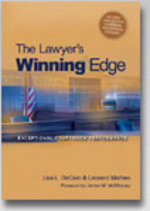Trial Preparation
You can't litigate if you don't advocate, and you can't advocate if you don't communicate.
You open the file. You review the matter. It looks like just another slip-and-fall. Dull. Or maybe it's an auto accident case. Pretty grisly-looking photos of the banged-up plaintiff. Perhaps it's a breach of contract case. Fifty-page long document, and the quibble is over whether the delivery of non-galvanized flashings is a breach. That's even duller than the slip-and-fall, and it’s full of technical stuff. It's all as pulse quickening as a pocketful of cold oatmeal. How in the name of all that's holy are you going to give life to this kind of stuff, anyway?
It's not an idle question. For a litigator to function effectively as an advocate, he or she has to get through to a group of people who were chosen specifically because of how little they know about the case. There is no way to do this apart from telling a good story and telling it well. What is needed is a firm grasp of the basics and finer points of courtroom performance.

